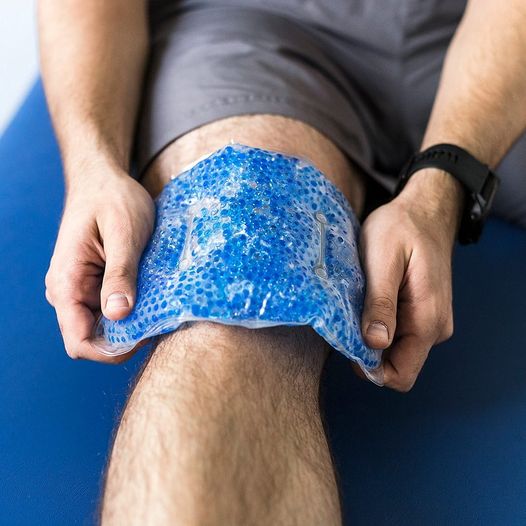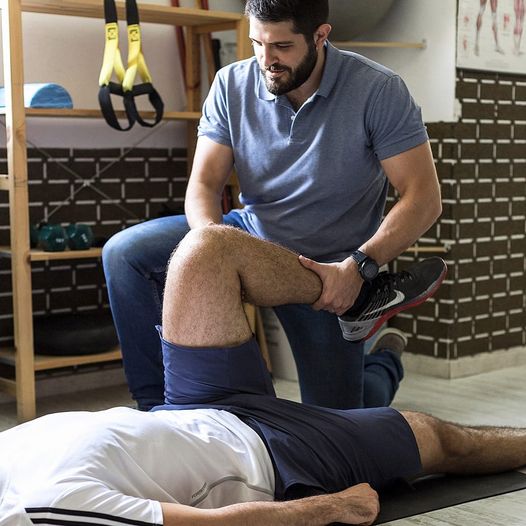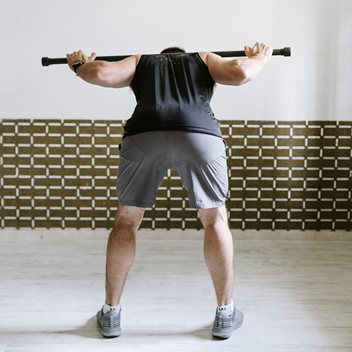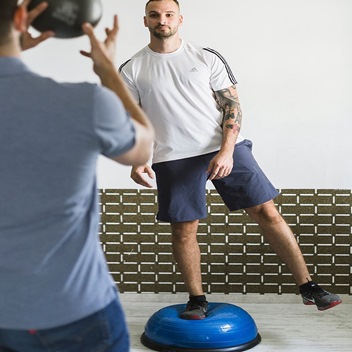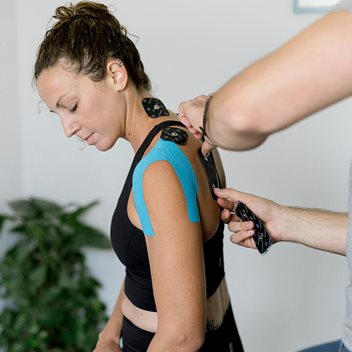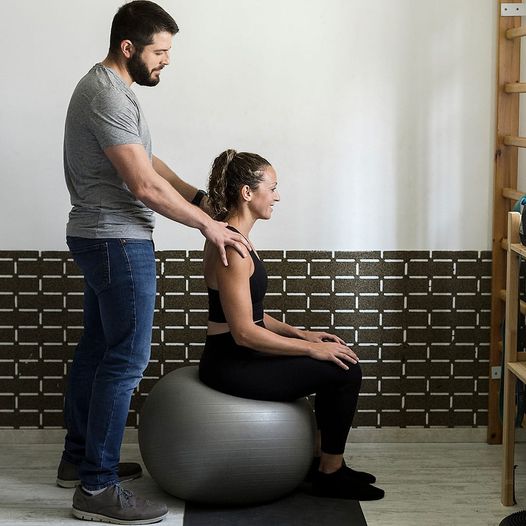
Sports Physiotherapist
If you play a professional or amateur sport and experience pain or injury that interferes with your training, talk to me. As an athlete and fitness instructor myself, I can help you. Get the best!

Post-operative Physiotherapist
Have you had knee, back, and shoulder surgery? Postoperative rehabilitation is the most important part. Without good Physiotherapy rehabilitation, the surgery will not succeed.

Vestibular Physiotherapist
Anyone who has experienced a dizziness (vertigo) attack knows that it is an unbearable condition and that you want a solution now! A response every day and every hour. Call me, why suffer?

Physitherapist at Home
Who said patients need to get as far as our clinic?
Can’t or don’t want to leave your home or hotel? No problem, I’ll bring the clinic to you all the way.
The Best Physiotherapist
If you are asked what physiotherapy is, probably the first association that will come to most of us’ minds is entering some such room that is full of scented candles and in the middle stands a massage bed, next to which there are all kinds of oils. Or maybe some physical therapy exercises with rubber bands in a variety of colors and jumping on one leg. Well, you guys are close …. but not really.
A physiotherapist is a body movement specialist, with very extensive knowledge in skeletal muscle anatomy with hundreds of hours of study of courses related to medicine and treatment.
During the degree, there are very diverse courses in human body physiology, pharmacology, internal medicine, surgery, orthopedics after the basic studies begin to study the practical areas of physiotherapy which are orthopedic treatments, respiratory therapies, neurological treatments, and more.
The first degree lasts 4 years, with about 3 years of academic studies and another year of training period in departments and institutes. After graduation, the physiotherapist acquired the basis to become a physiotherapist, but from that moment on, the learning and specialization process will never end.
Physiotherapy is a clinical profession that requires the physiotherapist to take everything he has learned during the degree and to refine all the knowledge he has gained to create a relevant treatment that is tailored to each patient. The most appropriate treatment.
Pay attention! Not every medical professional is a clinical professional. For example, a pharmacist understands a lot about medicines and knows exactly which medicine is given for which disease, but he is not allowed to give medicines without a doctor’s instruction.
In order to be a physiotherapist, you need to get a bachelor’s degree in physiotherapy from one of the universities in the country. In addition, physiotherapy is a profession supervised by the Ministry of Health! Compared to many other therapeutic professions that are not.
My research focuses on shoulder pain. The shoulder is one of the few joints that are not completely clear in the world of physical therapy, due to its great complexity and the difficulty in identifying the problem and the source of the pain.
My research focuses on improving the ability of the world of physiotherapy in identifying the problem and developing more effective treatment, one that will solve the problem with fewer treatments and with higher success rates.
Any fitness club owner or trainer experiences injuries of his trainees. We all know how much it sucks that the trainee comes from the orthopedist with an instruction to stop exercising when it is clear to us that the solution is exactly the opposite – movement and strengthening. But it is clear to us that adjustments need to be made and with the right judgment, here I come into the picture with giving appropriate emphases, what to watch out for, what to pay attention to and when to refer for treatment.
In addition, you will receive from me a monthly follow-up on the training program and emphasis on abnormal loads and more correct load distribution with medical vision and injury prevention.
So let’s together avoid the next freeze.
Call me and we will meet expectations: 050-883-8982.
Later you will find that it pays off for you and of course your customers as well.
My patients want only me and will not give up on me.
Want to know why? Because I’m better than others. I care.
I love my job.
I feel responsible for my patients and take care of them. My patients are not a client who happened to pass by me. I invest thought in their needs.
I read and study constantly, in the field of physiotherapy, because I enjoy the work and enjoy providing excellent care.
I understand exactly what it means to perform work responsibly and completely.
Not every patient can reach me at the clinic from a great distance.
Therefore, here is a list of the recommended physiotherapists in Israel by area of activity.
When to consult a physiotherapist?
In Rough generalization, I would say that in almost any pain, except abdominal pain, it is advisable to make an appointment with a physiotherapist. Each of us feels some pain, neck pain, shoulder pain, back pain, knee pain, in short, some pain in the limbs, and sometimes even headaches, and the last thought that comes to mind is to consult a physiotherapist, and here is the mistake. I will explain why.
In most non-fracture or acute trauma cases, physiotherapy treatments are the preferred treatment in modern medicine, and in most cases, physiotherapy alone may solve the problem, usually without the need to take any medication.
But physiotherapy treatment is much more effective the earlier it is given, close to the discovery of the problem. It should be emphasized, the physiotherapist does not only alleviate the pain, he treats the root of the problem and solves it.
Therefore, in most cases where a new pain arises, it is advisable to contact your physiotherapist immediately, without delay, even if in the meantime, just in case, you have already set up a meeting with an orthopedist.
Referral to a physiotherapist by an HMO doctor
In the past, reaching a physiotherapist through a health insurance fund involved a long bureaucracy. You had to visit the family doctor, who referred you to an orthopedic doctor, who after a short interview sent you to a physiotherapist. But today the process is different. HMOs have realized that the later your appointment with a physiotherapist, the longer your treatment will be, and of course, more expensive to the HMO will be.
Therefore, most HMOs allow their clients to contact a physiotherapist directly who is definitely qualified to make sure that the treatment they need is physiotherapy.
In your first appointment with a physiotherapist, he will review your medical history and examine the problem from every possible aspect to decide if it is related to the skeleton or muscle, and whether to try to solve the problem through physiotherapy or if the problem is more severe and requires other medical intervention.
If your physiotherapist suspects a problem unrelated to the skeleton or muscle, he will send you directly to the right doctor.
Since the first examination by the physiotherapist is very important, it will be very meticulous and a lot of thought is invested in it. After that, you will start with the physiotherapy treatment that will lead to complete medicine or you will be referred to another suitable doctor.
Sometimes, the physiotherapist will recommend a double route: physiotherapy treatments and at the same time you will be asked to make an appointment with a specialist doctor – an orthopedist or another (your physiotherapist knows how to guide you).
In this way, the patients receive prompt treatment that in most cases will solve the problem before it gets worse.
The role of a physiotherapist
Physiotherapy has 4 main areas:
Respiratory Physiotherapy –
Mostly you will meet them in the hospital wards, helping people after surgeries who have difficulty in the breathing process and their job is to get the breathing back to normal.
Especially today, during the Coronavirus period respiratory physiotherapists have a lot of work. Most of the work is in hospitals in the surgical wards, intensive care units, and corona wards.
Pediatric Physiotherapist –
Deals with the child’s development, accompanying the child’s normal developmental process and intervening when there is abnormal development. Most of the work is in the Ministry of Education Departments in special education schools and institutes of child development.
Neurology Physiotherapist –
Physiotherapy deals with rehabilitation after a stroke, head injury, or spinal cord injury, in general, rehabilitation when there are injury damages to the nervous system. Here the physiotherapists rehabilitate patients after a stroke, head injury, spinal cord injury, and diseases of the nervous system such as Parkinson’s.
Physiotherapist Institute –
A field that is divided into two main branches. One is the rehabilitation industry and the other is the musculoskeletal pain management industry.
The rehabilitation industry focuses on restoring the functional state as it was before the injury, ie if you were skiing and tore a ligament in your knee and now you can not walk, whether you had surgery or not, you will have to undergo a long rehabilitation.
There are many surgeries in the orthopedic world including knee and shoulder surgeries as the main surgeries we encounter.
The second branch focuses on pain. The most well-known pains in the general population are back pain, neck pain, shoulder pain, various infections, knee pain, and more.
The institute physiotherapy has a type of specialization that is studied after completing a bachelor’s degree in advanced courses such as vestibular physiotherapy – for the treatment of dizziness, oral and maxillofacial physiotherapy for the treatment of the jaw joint and chewing system, pelvic floor treatment for men and women – this is a field throughout life like pregnancy for example.
Lymphatic physiotherapy deals with the lymphatic system and helps this system with various tools when it is damaged.
Even in the field of skeletal muscle, there are physiotherapists who focus more on the treatment of athletes, and on the other hand, there are those who actually go in the direction of the geriatric field – treatment of adults.
In addition, physiotherapists also integrate into the world of academia and research. It is possible to continue for a master’s and Ph.D. degree after completing the first degree.
Those who wish to pursue a master’s degree have the ability to pursue a research or clinical master’s degree. In the research degree, the physiotherapist will do a thesis, which is a real study in the world of physiotherapy usually on a topic of his choice.
I personally do research in the field of shoulder pain, where in the world of physical therapy there is difficulty in treating because of the great complexity of the shoulder joint.
So what do you do when you go to a physiotherapist, you ask
You will first go through an interview to understand the source of the problem, during the interview the physiotherapist will try to understand the problem in-depth, sometimes he will try to identify the mechanism that caused the problem.
In the interview, the physiotherapist will also refer to the general medical history and perform an integration between the general medical knowledge and the orthopedic knowledge in order to understand risk factors, relevant defects, and treatment options that he can use in the specific case. The purpose of the interview is to get as close as possible to diagnosis and understanding.
You will then undergo a physical examination aimed at confirming the diagnosis that the physiotherapist suspected in the interview.
Your physiotherapist will perform orthopedic tests, look at and evaluate movement, and be mainly impressed by the function. The purpose of the test is to confirm the diagnosis that the physiotherapist suspected in the interview and to identify relevant deficiencies on which the treatment will be planned.
Finally, your therapist will build a treatment plan tailored to your situation. There are many tools we use such as muscle training and relevant range of motion, manual therapy, electrotherapy (medical equipment), and more.
Each tool is a world of its own, and your physiotherapist will know how to combine the forms of treatment and customize the best treatment for you! (Do not worry! Each form of treatment will have a separate post on my site).
So do not compromise on less than a physiotherapist !! Feel free to consult any question and send a message or call!
What to bring with you to the first appointment with a physiotherapist?
Prior to the first treatment, it is recommended that you bring with you medical documents relevant to the pain that you want to treat and of course any document or medical history for the physiotherapist’s review so that he can get a complete picture of you.
If you do not have documents, or you do not have a medical history, you can just tell a physiotherapist about the pain that is bothering you, and especially, how the pain started. This information will be very helpful in locating the problem and accurately treating its roots.
During and between the treatments, you should inform your physiotherapist about improvements, or aggravation so that he can be as precise as possible about the continuation of the treatment.
During the treatments, we will focus on improving the performance of daily activities, their independence, and safety. We will work on reducing pain, strengthening muscles, and improving movement. In most cases you will also need to “do your homework”, ie practice according to the instructions you will receive at the end of each treatment. If the practice produces pain, consult your physiotherapist.
- Physiotherapist
- Back Pain
- Neck Pain
- Shoulder Pain
- Knee Pain
- Physiotherapy exercises
- Vestibular Physiotherapist
- Sports Physiotherapist
What my patients say about me




20, HaTayelet St., Ashdod
Set up a consultation at
055-432.37.00
Drive to the Ashdod Clinic
20, HaTayelet St., Ashdod
1, David Hamelech St., Hertzlia
Set up a consultation at
055-432.37.00
Drive to the Hertzlia Clinic
1, David Hamelech St., Hertzlia
Call me or send a message/WhatsApp for any advice (+972) 055-432.37.00




